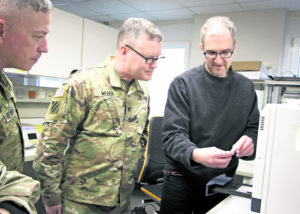On Saturday, March 14, Landstuhl Regional Medical Center opened the doors to its COVID-19 (Novel Coronavirus) Screening Center in an effort to reduce risk exposure and spread of the virus.
While LRMC is equipped with the 2019-Novel Coronavirus Real-Time Reverse Transcriptase Diagnostic Panel, and is the only U.S. military medical treatment facility in Europe with diagnostic testing capabilities, the opening of the clinic has left many questions for individuals eager to get tested for COVID-19 confirmation.
“The COVID-19 Screening Center is available for evaluating and assessing those who meet the criteria to be tested in order to maximize our resources,” said U.S. Army Lt. Col. Laura Ricardo, chief of Preventive Medicine and the COVID-19 public health nurse lead at LRMC. “It’s imperative we prioritize using the COVID tests for people who have either had direct contact with someone who is positive for COVID-19 and are symptomatic.”

As the medical community finds out more about symptoms and spread regarding COVID-19, LRMC continues to follow screening procedures recommended by the Centers for Disease Control and Prevention.
The screening and testing process
Individuals with a fever at or above 100.4 degrees Fahrenheit AND cold symptoms (cough, congestion, runny nose, shortness of breath) should proceed to the COVID-19 Screening Clinic, located next to the LRMC Emergency Room. Once the testing is complete, patients will be instructed to return home and self-quarantine until they are called back with results.
If people who are tested have other conditions for which they need to be evaluated in a different clinic or department of the hospital, they will be given a note to take with them to the follow-on clinic that states they have been screened and tested. They will be instructed to keep a mask on at all times and to sanitize their hands frequently.
Individuals who do not meet both the fever and cold symptoms criteria will not be tested. This includes people who may believe they have been exposed to or were around people who may have tested positive for COVID-19 but are without symptoms.
“We need the population with flu-like symptoms to stay home, practice social distancing and self–isolation until they feel (as with a flu) they need clinical evaluation,” said Ricardo. “People who do not meet both testing criteria or those who have other urgent/emergent needs should not go to the COVID-19 Screening Clinic as it may expose them to other people who may actually have the coronavirus.”
When the results are in
Once the testing is completed and individuals are instructed to go home and self-quarantine, the results are typically returned within 24-48 hours. Service members who are instructed to quarantine will work with the clinic staff to ensure their leadership are aware of the medical guidance.
If a test is positive, the patient is immediately contacted by Ricardo and her team of public health nurses to start the Contact Tracing process and identify those with whom they may have come into Close Contact (read more about Close Contacts on page 3 or at https://go.usa.gov/xdt26). Patients with positive tests will be instructed on how to properly isolate themselves within their homes.
If a test is negative, the patient will be contacted by the on-call COVID response team with further instructions on how to best recover from their flu-like symptoms.
What the CDC says
For most people, the immediate risk of becoming seriously ill from the virus that causes COVID-19 is thought to be low. Some international destinations (including most European countries) now have ongoing community spread. Community spread means some people have been infected and it is not known how or where they became exposed.
Older adults and people of any age with underlying health conditions, such as diabetes, lung disease, or heart disease, are at greater risk of severe illness from COVID-19.
“We want to relay that flu-like symptoms for the majority of the population is likely due to having the flu,” states Ricardo. “We want everyone to know the COVID-19 Screening Clinic is available for everyone in our military community, but to be tested for a sense of security is not going to be useful. Testing just for peace of mind is a quick way to deplete available resources for those who truly need to be tested.”
Ultimately, the medical provider at the COVID-19 Screening Clinic determines the need for testing.
The CDC does not recommend testing, symptom monitoring or special management for those who may have been exposed to asymptomatic people with potential exposures to COVID-19.
Military community members living in Germany who are concerned about their exposure risk to COVID-19 should call the TRICARE Nurse Advice Line at 0800-071-3516 to discuss any symptoms and seek advice on further instructions for care. Or visit https://rhce.amedd.army.mil/Families/nurse_advice_line.html for more NAL contact information. As always, if your conditions are life-threatening, please call emergency services or visit the nearest emergency room.


